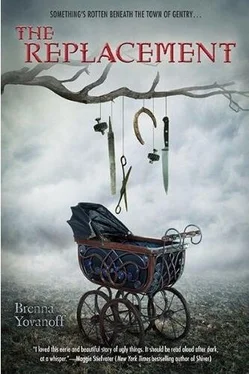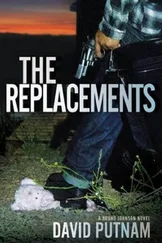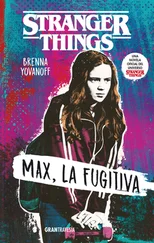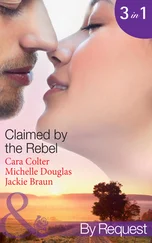“You weren’t at the funeral yesterday,” she said.
Between us, the current seemed to hum louder. I nodded.
“Why? I mean, your dad seems like he’d be all about ‘pulling together as a community,’ and considering he pretty much organized the whole thing . . . And, I mean, Roswell was there.”
“Religion is my dad’s business,” I said, and my voice had a flat, mechanical sound that showed me for what I was—a bad liar reciting someone else’s lie. “Anyway, a funeral isn’t really an ideal social event. I mean, it’s not like I would attend one for fun or anything.”
Tate just watched me. Then she folded her arms tight across her chest, looking small and wet. Her hair was plastered against her forehead. “Whatever. It’s not like it matters.”
“You’re taking it really well.”
Tate took a deep breath and stared up at me. “It wasn’t her.”
For a second, I didn’t say anything. Neither of us did. But we didn’t look away from each other. I could see flecks of green and gold in her eyes and tiny spots so deep and cool they looked purple. I realized that I hadn’t really looked at her in years.
She closed her eyes and moved her lips before she spoke, like she was practicing the words. “It wasn’t my sister in that box, it was something else. I know my sister, and whatever died in that crib, it wasn’t her.”
I nodded. I was cold suddenly, goose bumps coming up on my arms in a way that had nothing to do with the rain. My hands tingled and started to go numb.
“So, are you just going to stand there looking like a piece of furniture?”
“What do you want me to say?”
“I don’t want you to say anything—I want someone to listen to me!”
“Maybe you should talk to a school counselor,” I said, looking at my shoes. “I mean, that’s what they’re there for.”
Tate stared up at me and her eyes were wide and hurt and, for the first time, full of tears. “You know what? Fuck you.”
She crossed the lawn to her car and swung herself into the driver’s seat. She slammed the door, wrenched the transmission into reverse, and backed out onto the road.
After she’d made it all the way down Benthaven and disappeared around the corner, I let myself slump against the oak tree, sinking to a crouch with my back against the trunk.
I barely felt the rain as it ran down my forehead and the back of my neck.
I hadn’t given away my secret because I didn’t even know how to say the secret out loud. No one did. Instead, they hung on to the lie that the kids who died were actually their kids and not just convincing replacements. That way, they never had to ask what had happened to the real ones. I had never asked what happened to the real ones.
That was the code of the town—you didn’t talk about it, you didn’t ask. But Tate had asked anyway. She’d had the guts to say what everyone else was thinking—that her true, real sister had been replaced by something eerie and wrong. Even my own family had never been honest enough to come right out and say that.
Tate had made herself a loner and an outcast when I was the one who was supposed to be the freak. I’d shied away like she might infect me, but she was just a girl trying to get a straight answer from the most obvious source.
And yes, I was obvious. When it came down to basic facts, I was weird and unnatural, and the game only worked as long as everyone else agreed not to see. If you took all the kids in school and lined them up, it was clear that I was the one who didn’t belong. I was the disease. I crouched under the dripping tree and covered my head with my hands.
I’d treated her like shit because I’d had no choice. This was how the game went, and when you got down to it, what mattered most was staying out of sight. Everything else was secondary. There was no way to fix what I’d done, no way to take it back, because it was just me.
“I’m sorry,” I said to the pale, drizzly sky and the dying grass and the tree. To the empty parking lot and my own shaking hands.
Chapter Six
Fridays at Starlight
When Roswell picked me up after dinner for our weekly trip downtown to see the showcase of local bands, we didn’t talk much. I stared out the passenger window while he messed around with the radio, trying to find something he liked.
Finally, he switched it off. “So, are you going to tell me what’s wrong?” His voice sounded loud in the silence.
“What?”
He didn’t look away from the road. “You’re not too chipper tonight is all.”
I shrugged and watched the strip malls go by. “Tate Stewart is . . . It’s just, she freaked out in class today. She wanted to talk to me, and I don’t know what to say. Her sister died —she needs a professional.” And because those things were true but not the whole truth, I told him something else, so hoarse and low it was almost a whisper. “Roz, I don’t feel good. I haven’t felt good in a long time.”
Roswell nodded, tapping his palms on the steering wheel in four-four time.
“What’s it like?” he said suddenly. “Being—you know.”
He made it sound so easy, like he was asking about hemophilia or having double-jointed thumbs. It took me a second to realize I’d stopped breathing. It was hard to describe something you weren’t supposed to talk about. And yeah, maybe my dad liked to call it uncommon —this neutral, sanitary word—but I could tell sometimes, just by the look on his face, that what he really meant was unnatural .
Beside me, Roswell was still ticking his fingers against the steering wheel. Finally, he rolled his head to the side and looked at me.
He wasn’t stupid. I knew that. He’d known me pretty much my whole life, so it wasn’t like I thought I was fooling him. The thing that kept me mute was the chance that if I said it out loud, he’d look at me differently. Maybe it wouldn’t be obvious—he’d try not to let it show—but the difference would be there.
And that was bad enough, but stranger, deeper was the fear that nothing would change at all. He might just shrug and carry on like always, which was somehow worse. The truth was an ugly thing, and I couldn’t stand the possibility that he might be okay with it when it wasn’t okay.
He was quiet, watching me in the pauses at stoplights, waiting for an answer.
I rolled down the window and stuck my head out, letting the rain splash against my face. I knew that if I opened my mouth, I’d tell him. The cold air was helping, a little, but under the car’s fiberglass quarter panels, the frame was carbon steel and I was starting to feel sick. It was getting worse.
Roswell let out his breath in the long, pressurized sigh that meant he had something on his mind. “I’ve been thinking,” he said after a minute. “This is totally not scientific, and maybe it’s not even my business—but do you think you might be depressed?”
I looked down at my hands and then I made fists. “No.”
I knew what it looked like. Lately, I was a mental-health pamphlet, answering questions in monosyllables, avoiding strenuous activities, sleeping too much. I wanted to tell him that it wasn’t as bad as it seemed. I was just doing my part, playing invisible. That when you’re tired all the time and you have to keep your sleeves pulled down over your hands so you don’t accidentally touch a handle or a doorknob and a good day is defined by the fact that no one noticed you exist, that’s pretty depressing. But it’s not clinical.
The Starlight music hall had been a movie theater in the fifties and a regular theater before that. The building was three stories of chalky stucco, trimmed around the windows and the roof with spirals of wrought iron, but now it was rusting like everything else, leaving stains that ran down the front of the building like dried blood. We got in line and gave the bouncer two dollars apiece.
Читать дальше












